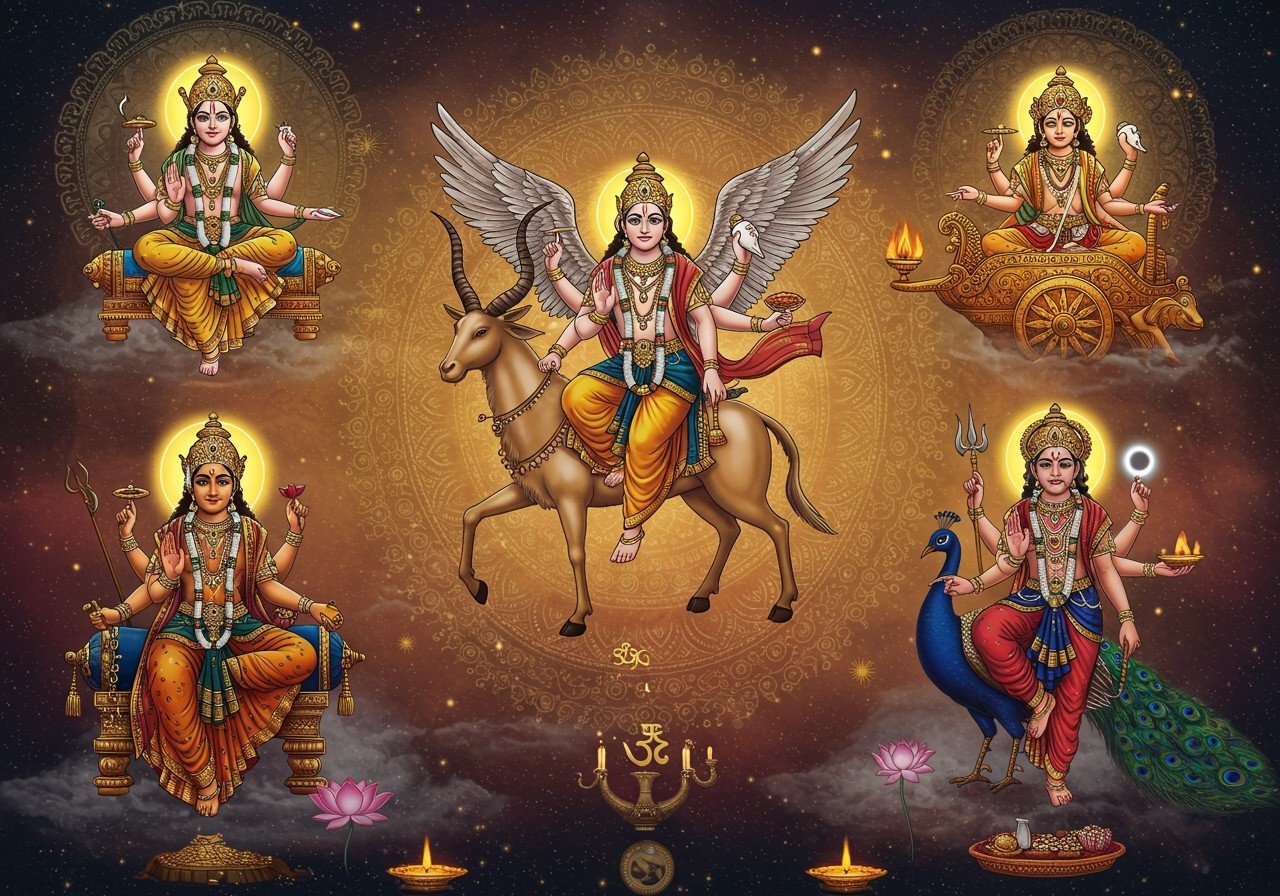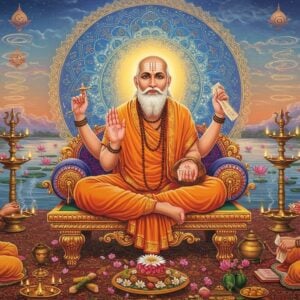
Hindu mythology, a vast and intricate tradition, encompasses a multitude of gods and goddesses beyond the well-known trinity of Brahma, Vishnu, and Shiva. These lesser-known deities possess unique roles and captivating narratives, woven into the cultural and spiritual fabric of Hinduism. This article delves into the stories of some of these deities, illuminating their significance and the ways they are honored in various rituals and practices.
Earth, Fire, Wind, and Water: The Fundamental Elements
Prithvi, the Earth Goddess, embodies fertility and sustenance, nourishing all living beings. She is revered in the Vedas and Puranas as a nurturing mother figure, vital for agriculture and the well-being of communities. Diverse rituals and festivals across India celebrate Prithvi, highlighting her essential role in daily life and the ecological balance of our world. Her relationship with Dyaus Pita, the Sky God, symbolizes the harmony of earth and sky, a powerful reminder of the interconnectedness of nature.
Agni, the Fire God, holds a pivotal role in Hindu rituals and mythology. As both a physical element and a divine entity, Agni serves as a link between humans and the divine realm, carrying offerings to the gods. He manifests in various forms, including Jataveda and Grihapati, each with specific duties. Agni Pariksha, the trial by fire, stands as a significant test of purity, appearing in epic tales such as the Ramayana. Agni’s importance is underscored in sacred Vedic rituals like Yajna. His fiery image is immortalized in temple art and architecture, representing transformation and purification.
Vayu, the Wind God, personifies air and breath, essential for all life. Revered as the father of Hanuman, Vayu is prominent in myths and legends. In yogic practices, he represents Pranayama, the control of breath for spiritual evolution. Vayu’s influence extends to weather and climate, depicted in Hindu cosmology as a formidable force. His significance is celebrated through festivals and rituals, recognizing his power and influence. Artistic depictions of Vayu emphasize his dynamic nature and highlight his importance to both ancient and contemporary discussions about air quality and its impact on our well-being. Explore breathing exercises for meditation and discover ways to calm your mind.
Beyond the Elements: Exploring Other Deities
Varuni, also known as Madira Devi, is the Goddess of wine and the consort of Varuna, the Water God. Emerging from the Samudra Manthan, the churning of the ocean, Varuni symbolizes the ocean’s mystical depths and the divine pleasures of nature. Her presence in Hindu mythology underscores the balance of the natural world and the respectful enjoyment of its gifts. Varuni is invoked in rituals for prosperity and joy. Her depictions in art and stories reflect themes of abundance and celebration.
Riddhi and Siddhi, twin goddesses and wives of Lord Ganesha, represent a harmonious blend of material and spiritual fulfillment. Riddhi embodies abundance and prosperity, while Siddhi symbolizes talents and spiritual prowess. Together, they inspire the pursuit of both worldly success and enlightenment. Devotees honor these goddesses during festivals dedicated to Ganesha. Their stories encourage a balanced approach to life, recognizing the interconnectedness of material wealth and spiritual growth.
Dhanvantari, an avatar of Lord Vishnu, is revered as the god of medicine and the father of Ayurveda. He embodies health, healing, and longevity. Emerging from the Samudra Manthan with the pot of Amrita, the nectar of immortality, Dhanvantari’s teachings form the basis of traditional Ayurvedic practices. Celebrated during Dhanteras, the festival of health and wellness, Dhanvantari emphasizes the importance of holistic well-being and natural healing methods. Consider purchasing authentic puja items and resources for worshipping various Hindu deities from poojn.in.
Janguli, the Mistress of Snakes, is an ancient goddess venerated by shamanic tribes in northern India and Nepal. She offers protection against snakebite and all forms of poison, including food poisoning. Invoked in tribal rituals for protection and healing, Janguli signifies the profound connection between humans and nature, emphasizing respect for wildlife. She embodies resilience and survival in the face of natural challenges. You can find a wide variety of sacred items related to deities and rituals on poojn.in.
Sitala, the goddess of smallpox, is worshipped to avert disease outbreaks. Her presence in homes and temples serves as a reminder of health vigilance. Rituals honoring Sitala involve offerings and prayers for immunity and protection. Her significance underscores the cultural emphasis on disease prevention and community health care, reflecting the enduring faith in divine intervention for well-being.
Poojn.in: Your Spiritual Companion
Poojn.in offers a diverse selection of authentic puja items and resources to support your worship of various Hindu deities, including the lesser-known gods and goddesses:
- Complete Puja Samagri Kits: Procure all the essential items you need for specific deity worship, conveniently packaged for your ease.
- Murtis (Idols): Discover beautifully crafted murtis of various lesser-known deities in pure brass and copper, adding a touch of devotion to your sacred space.
- Traditional Puja Thalis: Choose from a range of puja thalis specifically designed for offerings to particular deities, enhancing the authenticity of your rituals.
- Rudraksha Malas & Sacred Threads: Find genuine rudraksha malas and sacred threads, blessed for deity worship, deepening your connection to the divine. Explore our collection of Lord Shiva murtis.
- Ritual Items: Access authentic dhoop, agarbatti, and other ritual essentials from trusted sources, ensuring the purity and sanctity of your practices. Shop for Mangalam Camphor now.
- Religious Texts & Prayer Books: Delve into religious texts and prayer books containing mantras for specific deities, enriching your understanding and devotion.
- Expert Guidance: Receive expert guidance on proper puja vidhi (ritual procedures) through our dedicated customer support, ensuring the correctness and efficacy of your worship.
Embracing the Richness of Hindu Mythology
Exploring lesser-known Hindu deities like Varuni, Riddhi, Siddhi, Dhanvantari, Janguli, and Sitala unveils the vibrant tapestry of beliefs and traditions within Hinduism. Each deity provides unique perspectives on life’s multifaceted nature, encompassing prosperity, health, protection, and spiritual growth. By honoring these divine figures, we celebrate the intricate interplay between ancient traditions, the natural world, and contemporary life, drawing wisdom and inspiration from their enduring narratives.
Frequently Asked Questions about Lesser-Known Hindu Deities
Who is the Earth God in Hinduism? The Earth God is Prithvi or Bhudevi, the personification of Mother Earth, often worshipped for prosperity and fertility.
What is Agni’s significance? Agni, the Fire God, acts as a messenger between humans and gods, playing a key role in rituals and representing purification and divine knowledge.
Who is the Wind God? Vayu is the Wind God, symbolizing life force, breath, and influencing weather and seasons.
Are there lesser-known water deities? Varuna, the God of the oceans, upholds cosmic order and justice.
What is Surya’s role? Surya, the Sun God, is vital for life, providing energy, and is celebrated during Makar Sankranti.

